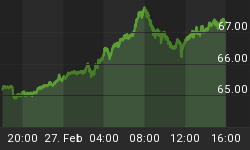Earnings season has begun again, and investor ebullience is in high froth. This isn't to say that every announcement, even announcements of "beats," is being treated with generosity. Indeed, what the market seems to need most, day in and day out, is to be removed as far as possible from actual news. The stock market did splendidly in November, when we were thinking about what the new Congress might do, and December, when we heard blessedly little about anything except snow. Modestly better economic news helped, but to me it seems like investors feel good generally about the market but aren't necessarily in love with specifics.
So, for example, Alcoa reports a 12% earnings beat, but is down on the day. Verizon makes the long-awaited announcement that it will carry the iPhone on its network, and the stock falls (Disclosure: I own some VZ). Bob Pisani on CNBC said that Alcoa wasn't down because of its fundamentals but because of its valuation. Since when was "valuation" not a fundamental - indeed the fundamental - detail about a stock!? (Yes, I turned on CNBC again since it was so useful yesterday to me in generating content for this comment. I left the TV on for a full 10-minute dose, the maximum I recommend as consistent with your mental and financial health, and then turned it off.)
Japan's finance minister said overnight that that country would buy bonds issued by the European aid regime with some of its foreign exchange reserves. Markets loved this general comment, without considering the specific point that in order to buy bonds from a quasi-sovereign bailout fund, Japan will obviously have to sell something else. True, it does give some much-needed credibility to a rescue plan that other central banks (see SNB) and big pension plans were running away from, but outside of those debt markets themselves it isn't clear to me that many markets were pricing the risk of an EU collapse (or the collapse of a periphery country that turns out to be too big to save, which would amount to nearly the same thing).
Inflation-linked bonds had a banner day, outperforming nominal Treasury bonds by 5-10bps across the curve. I received many inquiries about the possible causes of this outperformance. One possibility is that many people made New Year's resolutions to buy more TIPS. However, I suspect the real answer is more pedestrian.
In several days, the Jan-11 TIPS will mature and all of the Jan/July TIPS will pay coupons. Next Thursday, the Treasury will auction 10-year TIPS, and the Jan-12 TIPS will exit the indices at the end of the month since that issue will have less than 1 year remaining to maturity. So, there is a large net inflow of cash to TIPS owners, and the duration of the TIPS index will extend at month-end (dropping a 1-year instrument and adding some more 10-years). Also, on Friday the CPI print will probably push the year-on-year headline figure to its highest level since last May. Oh, and the Federal Reserve continues to buy TIPS approximately equal to the net supply from the Treasury.
All of that makes it hard to short TIPS, even at these low yield levels. The usual dynamics with value investors are missing, because while they're happy to buy low it's challenging to decide to sell high when you know it may be hard to buy them back. (Institutional investors ought to keep an eye on the repo market for TIPS, which almost always trades general collateral. If TIPS start trading special, then you know the supply is getting tight.)
.
Incidentally, today 01/11/11 isn't (of course) the first Binary Day. In this century the first was 01/01/00. How many others have there been? And which one converted to the highest decimal value? This is, however, only the second "Five Aces" Day, with the other one being 11/11/01.
.
There is no data tomorrow of note, and a storm is ticketed for New York with 8-14 inches of snow in its luggage. Expect a slow trading day. However, you should still tune in for this comment, as I will be discussing energy prices and Janet Yellen's latest comments on LSAP.















